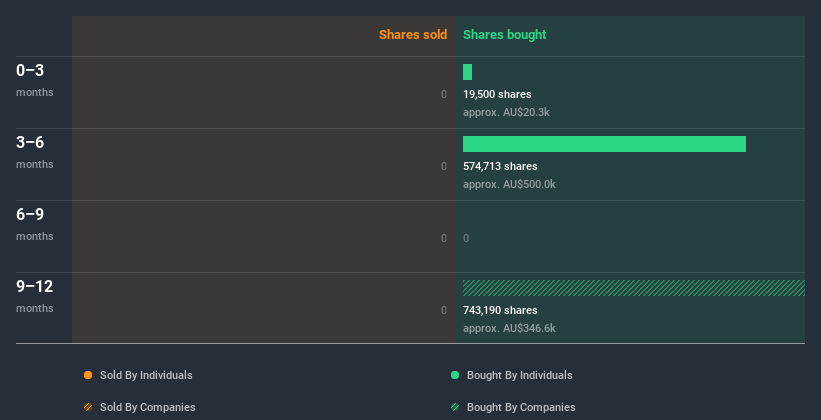Should You Take Comfort From Insider Transactions At Bill Identity Limited (ASX:BID)?
We've lost count of how many times insiders have accumulated shares in a company that goes on to improve markedly. On the other hand, we'd be remiss not to mention that insider sales have been known to precede tough periods for a business. So we'll take a look at whether insiders have been buying or selling shares in Bill Identity Limited (ASX:BID).
What Is Insider Buying?
It's quite normal to see company insiders, such as board members, trading in company stock, from time to time. However, most countries require that the company discloses such transactions to the market.
We don't think shareholders should simply follow insider transactions. But it is perfectly logical to keep tabs on what insiders are doing. For example, a Columbia University study found that 'insiders are more likely to engage in open market purchases of their own company’s stock when the firm is about to reveal new agreements with customers and suppliers'.
View our latest analysis for Bill Identity
Bill Identity Insider Transactions Over The Last Year
Over the last year, we can see that the biggest insider purchase was by Independent Non-Executive Director David Hancock for AU$500k worth of shares, at about AU$0.87 per share. That means that an insider was happy to buy shares at around the current price of AU$0.94. That means they have been optimistic about the company in the past, though they may have changed their mind. While we always like to see insider buying, it's less meaningful if the purchases were made at much lower prices, as the opportunity they saw may have passed. In this case we're pleased to report that the insider purchases were made at close to current prices.
While Bill Identity insiders bought shares during the last year, they didn't sell. You can see the insider transactions (by companies and individuals) over the last year depicted in the chart below. If you want to know exactly who sold, for how much, and when, simply click on the graph below!
There are always plenty of stocks that insiders are buying. So if that suits your style you could check each stock one by one or you could take a look at this free list of companies. (Hint: insiders have been buying them).
Bill Identity Insiders Bought Stock Recently
We saw some Bill Identity insider buying shares in the last three months. MD & Executive Director Guy Maine purchased AU$20k worth of shares in that period. It's great to see that insiders are only buying, not selling. But in this case the amount purchased means the recent transaction may not be very meaningful on its own.
Insider Ownership of Bill Identity
I like to look at how many shares insiders own in a company, to help inform my view of how aligned they are with insiders. A high insider ownership often makes company leadership more mindful of shareholder interests. It appears that Bill Identity insiders own 9.2% of the company, worth about AU$14m. While this is a strong but not outstanding level of insider ownership, it's enough to indicate some alignment between management and smaller shareholders.
So What Does This Data Suggest About Bill Identity Insiders?
Our data shows a little insider buying, but no selling, in the last three months. That said, the purchases were not large. But insiders have shown more of an appetite for the stock, over the last year. Insiders do have a stake in Bill Identity and their transactions don't cause us concern. So while it's helpful to know what insiders are doing in terms of buying or selling, it's also helpful to know the risks that a particular company is facing. To assist with this, we've discovered 2 warning signs that you should run your eye over to get a better picture of Bill Identity.
Of course, you might find a fantastic investment by looking elsewhere. So take a peek at this free list of interesting companies.
For the purposes of this article, insiders are those individuals who report their transactions to the relevant regulatory body. We currently account for open market transactions and private dispositions, but not derivative transactions.
This article by Simply Wall St is general in nature. It does not constitute a recommendation to buy or sell any stock, and does not take account of your objectives, or your financial situation. We aim to bring you long-term focused analysis driven by fundamental data. Note that our analysis may not factor in the latest price-sensitive company announcements or qualitative material. Simply Wall St has no position in any stocks mentioned.
Have feedback on this article? Concerned about the content? Get in touch with us directly. Alternatively, email editorial-team (at) simplywallst.com.

